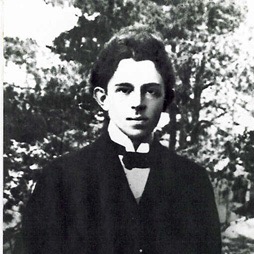By way of introduction into the subject of Mandelshtam’s connection with ancient Greece, we publish here an excerpt from the memoirs of Konstantin Mochulsky, Mandelshtam’s Greek tutor (The Crisis of Imagination: Articles, Essays, Portraits).
“In 1912 Osip Emilievich began his studies at the Department of Philology of the Petersburg University. He needed to pass a Greek exam, and I offered him my help. He would come to lessons monstrously late, utterly stunned by the mysteries of the Greek grammar that had been revealed to him. He would flap his arms, run around the room and recite declensions and conjugations in a singsong. Reading Homer would turn into a fairy-tale occurrence; adverbs, enclitics, pronouns would haunt him in his sleep, and he would enter into cryptic personal relationships with them. When I informed him that the past tense participle of the verb paideuō (‘to educate’) was pepaideukos, he choked with delight and could not study any longer that day. He came to the next class smiling ruefully and said: “I did not do any homework, but I wrote a poem.” And, without taking off his coat, he started to sing. I remember two stanzas:
And a tolling bell of verbal endings
Indicates from far away my course,
So that in a cell of a humble philologist
I could have respite from my tristesse.
I forget adversities and sorrows,
And a question has me at a loss:
Is an augment requisite in aorist,
And what voice is pepaideukos?
Osip Emilievich did not resolve this question until the end of our studies. He was turning grammar into poetry and claimed that the more incomprehensible Homer was, the more superb. I was extremely worried that he would fail the exam, but the fate guarded him also there, and he passed the test by some miracle. Mandelshtam did not learn Greek, but he divined it.”
Translated by Natasha Bershadsky

